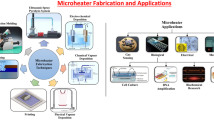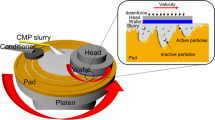Abstract
Injection molding PMMA microfluidic chips can significantly improve the efficiency of chips forming. However, due to the coexistence of macro and micro effects in the injection molding process, the thickness uniformity of molding substrates is poor, which will seriously affect the thermal bonding quality of chips. In this paper, the effect of injection molding PMMA microfluidic chips thickness uniformity on the thermal bonding ratio and the quality of micro-channels was studied by experiments and simulations. The results show that when the following three conditions were satisfied during injection molding process, chips bonding ratio reaches to 93.9 % and the distortions of micro-channels caused by thermal bonding were acceptable. Firstly, the cover plates flatness error is smaller than 50–60 μm and substrates flatness error is smaller than 80–90 μm. Secondly, the maximum thickness difference of stack chips (cover plate stack with substrate) is smaller than 70–80 μm. Thirdly, chips thickness of the middle is larger than that of the two ends along their length direction and chips thickness distribute evenly along their width direction. These conclusions can be used for the parameters selection and moulds design during injection molding process of PMMA microfluidic chips.







Similar content being viewed by others

References
Attia UM, Marson S, Alcock JR (2009) Micro-injection moulding of polymer microfluidic devices. Microfluid Nanofluid 7:1–28. doi:10.1007/s10404-009-0421-x
Buchanan G R (1995) Schaum’s Outline of Theory and Problems of Finite Element Analysis. McGraw-Hill Companies, Inc. New York
Cheng K (2009) Cause and prediction of the defects in the process of injection molding for micro-fluidic chip. Dissertation, Dalian University of Technology
Chow WWY, Lei KF, Shi GY, Li WJ, Huang Q (2006) Microfluidic channel fabrication by PDMS-interface bonding. Smart Mater Struct 15:112–116. doi:10.1088/0964-1726/15/1/018
Giboz J, Copponnex T, Mélé P (2007) Microinjection molding of thermoplastic polymers: a review. J Micromech Microeng 17:96–109. doi:10.1088/0960-1317/17/6/R02
Torsten V, Dirk J, Andreas M (2004) Micro total analysis systems recent developments. Anal Chem 76:3373–3386. doi:10.1021/ac040063q
Wang TH, Young WB (2005) Study on residual stresses of thin-walled injection molding. Eur Polymer J 41:2511–2517. doi:10.1016/j.eurpolymj.2005.04.019
Wen M, Wang XD et al (2004) Research on hot embossing and thermal bonding for fabrication of PMMA microfluidic chips. Optics Precis Eng 12(5):272–276 (in Chinese)
Yao D, Vinayshankar VL, Kim B (2005) Study on squeezing flow during nonisothermal embossing of polymer microstructures. Polym Eng Sci 45:652–660. doi:10.1002/pen.20322
Yussuf AA, Sbarsk I, Hayes JP, Solomon M, Tran N (2005) Microwave welding of polymeric-microfluidic device. J Micromech Microeng 15:1692–1699. doi:10.1088/0960-1317/15/9/011
Zuo CD (2007) Study on the manufacture, measurement and simulation of polymer microfluidic chips. Dissertation, Jilin University
Acknowledgments
This work was supported by the National Natural Science Foundation of China (No: 51075057, 20890024), the National High Technology Research and Development Program of China (863 Program, No: 2012AA040406).
Author information
Authors and Affiliations
Corresponding author
Rights and permissions
About this article
Cite this article
DU, L., Chang, H., Song, M. et al. The effect of injection molding PMMA microfluidic chips thickness uniformity on the thermal bonding ratio of chips. Microsyst Technol 18, 815–822 (2012). https://doi.org/10.1007/s00542-012-1514-0
Received:
Accepted:
Published:
Issue Date:
DOI: https://doi.org/10.1007/s00542-012-1514-0



